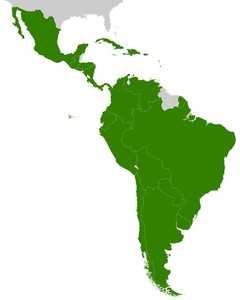By the end of 2021, biosimilar antibodies of rituximab, trastuzumab, infliximab, adalimumab and bevacizumab were expected to be commercialized in Latin America with 25 different brand names.
The market growth of biosimilar monoclonals can be attributed to several factors, such as the increasing demand for cost-effective biosimilars, rising production of advanced monoclonal antibodies, growing geriatric population or high prevalence of chronic diseases.
In the last decade, progress made in the regulatory pathways to register biological medicines with very high quality standards allowed the approval of the first generation of biosimilar monoclonal antibodies in Latin America that showed robust evidence of safety and efficacy. This process occurred in parallel with the expiration of the patents of the therapeutic monoclonal antibodies [1].
Several biosimilars of rituximab have been developed over the years, and by 2021 there were five different biosimilars of rituximab approved in Latin America, with nine different brand names commercialized in Argentina, Brazil, Chile, Colombia, Ecuador, Mexico, Paraguay, Peru and Uruguay.
Developed by Genentech in the US, rituximab is marketed with the brand name Rituxan® (also known as MabThera®) and is commercialized by Roche. Rituximab was approved by the Food and Drug Administration (FDA) in 1997 for the treatment of B-cell lymphomas and was the first chimeric recombinant monoclonal antibody approved against cancer.
Trastuzumab was developed in the US by Genentech, marketed under the brand name Herceptin® and manufactured by Roche. Approved by the European Medicines Agency and FDA in 1997 [2, 3], trastuzumab was the first humanized monoclonal antibody against cancer.
In 2021, there was a total of four different trastuzumab biosimilars approved in Latin America, with seven different brand names marketed in Argentina, Brazil, Colombia and Peru.
There are two infliximab biosimilars approved in Latin America, with broad distribution in the region, marketed under four different brand names in Argentina, Brazil, Chile, Colombia, Ecuador, Mexico, Paraguay and Peru. Infliximab was developed in the US by Janssen Biotech, approved by FDA in 1998 and marketed under the brand name Remicade®. It is used for the treatment of several conditions, including inflammatory bowel disease (IBD), Crohn’s disease, ulcerative colitis, rheumatoid arthritis, ankylosing spondylitis, psoriasis, psoriatic arthritis and Behçet’s disease.
Adalimumab (Humira®) is developed in the US by Abbott (today AbbVie), was the first fully human monoclonal antibody approved by FDA in 2002. Adalimumab was approved in 2003 in the European Union with the brand names Humira® and Trudexa®. It is a fully human IgG1/κ antitumour necrosis factor-alpha (anti-TNF-α) monoclonal antibody that prevents the interaction of TNF-α with its receptors, thereby interfering with the inflammatory signalling central to chronic autoimmune diseases such as rheumatoid arthritis, psoriatic arthritis, ankylosing spondylitis, Crohn’s disease, paediatric Crohn’s disease, moderate to severe chronic psoriasis and juvenile idiopathic arthritis.
At the end of 2021, there were three adalimumab biosimilars approved in Latin America, marketed under three brand names in Argentina, Brazil and Peru.
Bevacizumab (Avastin®) is a humanized monoclonal antibody with IgG1/κ isotype that targets the vascular endothelial growth factor (VEGF), which in turn prevents endothelial proliferation and inhibits angiogenesis. It was developed by Genentech, receiving its first approval in the US in 2004 by FDA, and is marketed by Roche. Originally indicated in combination use with standard chemotherapy against metastatic colon cancer, it has since been approved for use in certain lung cancers, renal cancers, ovarian cancers and glioblastoma multiforme of the brain.
Two biosimilars of bevacizumab were commercialized in Latin America by 2021. They are approved in Argentina, Brazil, Colombia, Ecuador and Paraguay; and traded under two brand names.
The commercialization of biosimilar antibodies is more relevant in countries like Brazil and Argentina, which have more than 10 different biosimilar monoclonal antibodies approved and, as is the case for trastuzumab, three different biosimilars approved competing with Herceptin®, the antibody of reference.
It is expected that more approvals of highly controlled biosimilars will increase the market competition and result in a significant reduction of prices compared to the reference monoclonal antibodies.
Related articles
Overview of monoclonal antibody biosimilars in Latin America
Federal purchases of biological drugs for cancer in Brazil
Monoclonal antibody biosimilars and cancer in the EU
Assessment of biosimilarity for monoclonal antibodies
| LATIN AMERICAN FORUM The new section of the ‘Latin American Forum’ on GaBI has been launched. The objective of this new section is to provide you with all the latest news and updates on developments of generic and biosimilar medicines in Latin America in Spanish. View this week’s headline article: Estado actual de los biosimilares de anticuerpos monoclonales aprobados en América Latina Browse the news in the Latin American Forum! Register to receive the GaBI Latin American Forum newsletter. Inform colleagues and friends of this new initiative. LATIN AMERICAN FORUM Se ha lanzado la nueva sección del ‘Foro Latinoamericano’ sobre GaBI. El objetivo de esta nueva sección es brindarle las últimas noticias y actualizaciones sobre desarrollos de medicamentos genéricos y biosimilares en América Latina en español. Vea el artículo principal de esta semana: Estado actual de los biosimilares de anticuerpos monoclonales aprobados en América Latina !Explore las noticias en el Foro Latinoamericano! Regístrese para recibir el boletín informativo GaBI Foro Latinoamericano. Informe a colegas y amigos sobre esta nueva iniciativa.
|
Reference
1. Karp P, Gatto M, Batto MV, et al. Biosimilar monoclonal antibodies in Latin America. doi:http://dx.doi.org/10.5772/intechopen.101227
2. GaBI Online - Generics and Biosimilars Initiative. Biosimilars approved in Europe [www.gabionline.net]. Mol, Belgium: Pro Pharma Communications International; [cited 2022 Jun 24]. Available from: www.gabionline.net/biosimilars/general/biosimilars-approved-in-europe
3. GaBI Online - Generics and Biosimilars Initiative. Biosimilars approved in US [www.gabionline.net]. Mol, Belgium: Pro Pharma Communications International; [cited 2022 Jun 24]. Available from: www.gabionline.net/biosimilars/general/biosimilars-approved-in-the-us
Permission granted to reproduce for personal and non-commercial use only. All other reproduction, copy or reprinting of all or part of any ‘Content’ found on this website is strictly prohibited without the prior consent of the publisher. Contact the publisher to obtain permission before redistributing.
Copyright – Unless otherwise stated all contents of this website are © 2022 Pro Pharma Communications International. All Rights Reserved.








 0
0











Post your comment